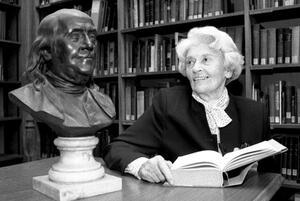Claude-Anne Kirschen Lopez
Claude-Anne Kirschen Lopez was a Jewish refugee and Classics scholar from Belgium who is widely acknowledged as the greatest historian of Benjamin Franklin’s private life. In a series of biographies and edited volumes of his papers, she re-defined Franklin. She also found time to mentor a generation of Franklin scholars. schoolchildren, Franklin impersonators, performance artists, and amateur historians and enthusiasts.
When the Germans invaded Belgium in 1940, she was forced to flee her Classics studies in Brussels and seek refuge in France. She was badly wounded by aerial bombardment there before escaping through Spain and Portugal. In September 1941, she arrived in New York aboard the typhus-stricken S.S. Navemar after a difficult crossing that became the subject of newsreels and survivor lawsuits.
She was working as a secretary to Byzantinist and fellow exile Henri Gregoire when she met her future husband, Robert Sabatino Lopez, a young medieval history professor and refugee from Italy. She later worked in New York for the Office of War Information, under Andre Breton, and for CBS; in Washington for the Belgian Economic Mission; and in San Francisco for the Belgian delegation to the founding conference of the United Nations. She also ghost-wrote a war memoir for her brother, who had been awarded a D.S.O. for multiple SAS parachute missions behind German lines.
In the early 1950s, she moved to New Haven when her husband accepted a teaching position at Yale. The university’s nepotism rules restricted her to jobs typing dissertation notes on rats in mazes and transcribing medical notes on lobotomies. When the Franklin Papers project was founded in 1954 at Yale’s Sterling Library, she got a job transcribing—not translating—the letters written in French from Franklin’s time as America’s ambassador to Paris.
In 2000, she told the Yale Bulletin and Calendar, “I was in my early 30s. I had a son who was five or six and a new baby, also a boy. The honest truth is that I was looking for a part-time job that I could do, preferably at home, while keeping an eye on the children. That's exactly what this was. It was a job that I was delighted to get. And so, for my 65 cents an hour, which is what I was paid in those days, I transcribed from French, Italian and Latin.”
As she would say in her last book, My Life With Franklin, “A faculty wife, in those days, was supposed to provide elegant entertainment for her husband’s colleagues, to help her husband prepare the index of his latest book—or to do it herself if she was exceptionally gifted—and above all to keep clear of any personal goal.”
Writing as if to Franklin, she told him she knew “practically nothing about you” when she started the job and what she did know “did not enchant me. As a schoolgirl in Brussels, I had been taught something about a battle being lost because a nail was missing from a horseshoe, and that a penny saved was a penny earned. This seemed irrelevant to my generation, and I must admit that your words of wisdom left me cold. But I had no choice: it was your papers or nothing.”
Knowing that the letters she was working on would not be published for years as part of the official collection, she started writing articles and books on her own. Her first book on Franklin Mon Cher Papa: Franklin and the Ladies of Paris was a sensation, praised in a full-page New York Times Sunday Book Review piece by the writer Andre Maurois and long reviews in The New York Review of Books, the Saturday Review and others.
It was still an uphill struggle. “A woman’s time is not her own and no one takes her seriously,” she told the Yale Newcomers’ Club in 1967. “Women have a guilt complex about taking time away from the family and lastly, women have many pretexts why they shouldn’t write. I wrote every one of my long-lost high school friends and cleaned everything in the house, but finally there was nothing more to do, and I had to sit down and face the typewriter. I have decided it doesn’t do anybody concerned any harm for a woman to take on a worthwhile project.”
While Mon Cher Papa had explored how Franklin used alliances and friendships to further his diplomacy, her next book, The Private Franklin, published in 1977 and co-written with Eugenia Herbert, explored a darker side of Franklin: his complex and difficult relationships with other family members, including the wife who stayed behind during his travels, and the son, a British loyalist, with whom he quarreled deeply.
Thirty years after joining it as an uncredited transcriber, she was named Editor-in-Chief of the Franklin Papers. She went into semi-retirement in 1987 but remained a Senior Research Scholar at Yale and consulted on Franklin with documentary producers and aspiring Franklin biographers. She also fulfilled a lifelong ambition to write fiction, creating a “diary” of Franklin’s grandson and secretary for the ushistory.org website.
She was knighted by Belgium’s King Baudoin and won fellowship and residency from the Guggenheim and Rockefeller Foundations.
Adapted from the family’s webpage. Used by permission.



